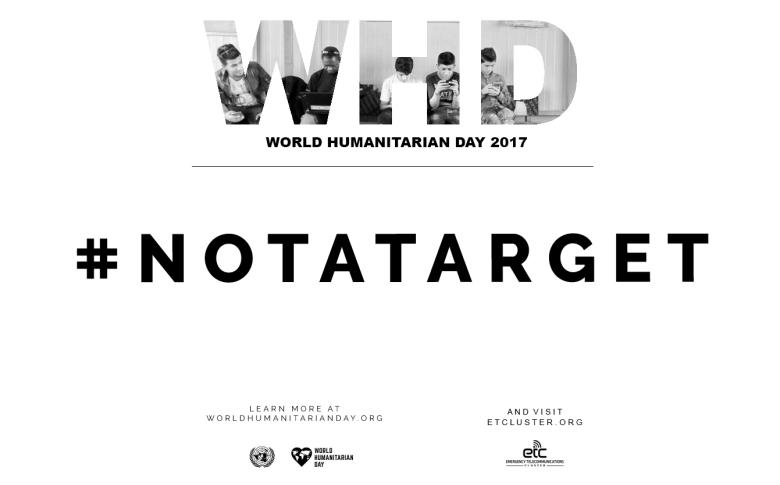World Humanitarian Day 2017

World Humanitarian Day, 19 August 2017 – today the world is honouring all humanitarian workers serving people affected by man-made and natural disasters worldwide.
This year’s message is even more encompassing - urging the global leaders to ensure that all civilians (including the aid workers) caught in the reality of war and armed conflict are not targets of military action.
Civilians are too often affected by conflict and violance – they are driven from their homes, struggle to find sufficient and nutritious food, suffer from sexual harassment, injuries or death. Today, the United Nations (UN) is calling on global leaders to take action to protect civilians. The UN launched the petition urging the world's politicians to ensure all parties to conflict respect and protect civilians, by:
1.
Protecting civilians in cities and towns, as well as their homes and the essential services they rely on.
2.
Pledging to protect children by ending their recruitment and use in fighting, and preserve children’s access to education by endorsing the Safe Schools Declaration.
3.
Preventing all forms of sexual violence in conflict, hold perpetrators fully accountable for their crimes, and offer survivors the opportunities and support that will enable their recovery and reintegration into society.
4.
Respecting the right of people who have been forced to flee their homes to seek asylum in another country; support the United Nations Secretary-General’s effort to reduce internal displacement by half by 2030.
5.
Ensuring aid workers have safe and unimpeded access to deliver humanitarian relief to people in need.
6.
Allowing health workers to treat and care for the wounded and sick regardless of who they are, and by ending attacks against health workers, ambulances, and hospitals.
As every year, this day also commemorates those who dedicate their lives to serve others. Humanitarian workers often operate in life-threatening environments – facing lootings, kidnapping, hostage situations, and in most extreme situations – executions. This reduces the safety of aid workers, making it difficult, if not impossible, to provide life-saving assistance, deliver necessary relief items, or as in case of the Emergency Telecommunications Cluster (ETC), to install life-saving communication channels to serve the humanitarian community, and the affected populations.
The UN reminds us that in the past 20 years, over 4,000 aid workers have been subjects to attack and in 2016 alone, 91 humanitarians were killed while serving others, mostly in South Sudan, Afghanistan, Syria, the Democratic Republic of the Congo, and Somalia. It is an imperative that all parties to conflict should respect humanitarian law – protecting the civilians but also the humanitarian workers, regardless of race, colour, sex, language, religion, or other status.
On 19 August 2003, a bomb attack on the Canal Hotel in Baghdad killed 22 humanitarian aid workers, including the UN Special Representative of the Secretary-General for Iraq, Sergio Vieira de Mello. Five years later, the General Assembly adopted a resolution designating 19 August as World Humanitarian Day.
The Canal Hotel bombing was a massive loss for the United Nations and the humanitarian community, and marked a turning point for humanitarian operations in Iraq and worldwide.
Source: United Nations